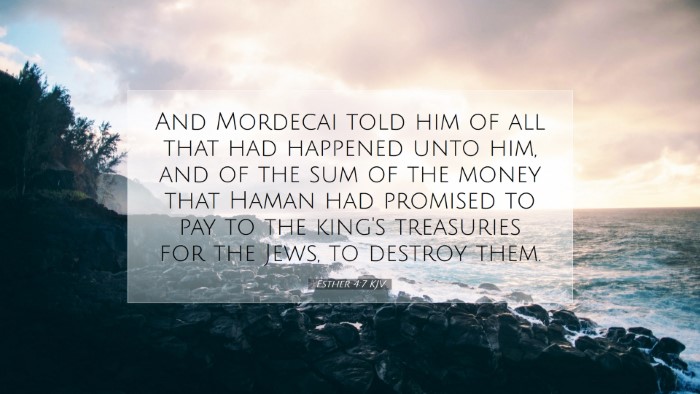Old Testament
Genesis Exodus Leviticus Numbers Deuteronomy Joshua Judges Ruth 1 Samuel 2 Samuel 1 Kings 2 Kings 1 Chronicles 2 Chronicles Ezra Nehemiah Esther Job Psalms Proverbs Ecclesiastes Song of Solomon Isaiah Jeremiah Lamentations Ezekiel Daniel Hosea Joel Amos Obadiah Jonah Micah Nahum Habakkuk Zephaniah Haggai Zechariah MalachiEsther 4:7
Esther 4:7 KJV
And Mordecai told him of all that had happened unto him, and of the sum of the money that Haman had promised to pay to the king's treasuries for the Jews, to destroy them.
Esther 4:7 Bible Commentary
Commentary on Esther 4:7
Esther 4:7 states, "And Mordecai told him all that had happened unto him, and of the sum of the money that Haman had promised to pay to the king's treasury for the Jews, to destroy them." This verse encapsulates a significant moment of communication between Mordecai and Esther, highlighting both the gravity of the situation for the Jewish people and the strategic role that Esther is called to play.
Contextual Analysis
The Book of Esther occurs during the Persian Empire, detailing the deliverance of the Jewish people from a plot to annihilate them. This particular chapter marks a turning point in the narrative where Mordecai informs Esther of Haman's sinister plan against the Jews. It is essential to recognize the historical and cultural backdrop that shapes this text.
Mordecai's Role
Mordecai serves not only as a relative to Esther but also as a protector and mentor. Matthew Henry highlights Mordecai's intelligence and foresight, as he communicates crucial information to Esther, helping her understand the dire stakes involved in Haman's decree.
- Responsibility: Mordecai's insistence on communicating the financial aspect of Haman's plan emphasizes the seriousness of the threat. Haman offered a substantial amount of money to the treasury, showcasing his power and intentions.
- Encouragement: Mordecai encourages Esther to act decisively. His actions and words serve as a catalyst for Esther's mission to intercede for her people.
Esther's Dilemma
This situation places Esther in a precarious position. Albert Barnes notes that Esther has to balance her identity as a Jew with her role as queen. The conflict between personal safety and the safety of her people weighs heavily on her throughout the narrative.
Theological Implications
Esther 4:7 provokes deep theological reflection on divine providence and human agency. Here, we see Mordecai's belief in God's sovereignty over the situation.
Divine Providence
From Adam Clarke's commentary, we learn that Mordecai’s report also serves to prepare Esther for her critical role. The unfolding of events suggests that although God is not explicitly mentioned, His providential hand guides every moment. The urgency of Mordecai's message underlines the necessity of divine intervention in human affairs.
Human Agency
Even within the overarching providence, Esther's willingness to act or refrain from acting exhibits significant themes of free will and responsibility. This interplay challenges both characters and readers alike to consider their roles in difficult circumstances. The moral imperative for Esther to take a stand is clear, as her actions could lead to either destruction or salvation for her people.
Application for Pastors and Theologians
This verse and its implications invite deep reflection for those in pastoral and scholarly roles. Here are several points of application:
- Leadership and Responsibility: Leaders in the church must be aware of the gravity of their decisions. Mordecai's role highlights the importance of guidance and mentorship, especially in crises.
- Encouragement to Intercede: Esther's eventual response to Mordecai’s challenge serves as a call for intercessory prayer and advocacy on behalf of those who are suffering.
- Faith in Divine Providence: The silence of God in the Book of Esther can remind congregants of faithfulness in the absence of visible divine action. This encourages trust in God's sovereignty.
Conclusion
Esther 4:7 is a pivotal verse that reveals much about human and divine interaction during times of crisis. With Mordecai as a catalyst, Esther is brought to a decision point where faith and action converge for the sake of her people. This passage reminds us of the importance of acknowledging both God's providence and our responsibility within His divine plan.


